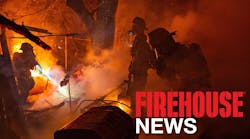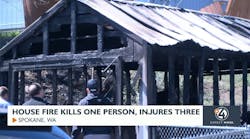Each time my teaching duties find me discussing leadership with a fresh crop of eager learners, one question always comes to the fore. During my introduction, each student is asked to think of the best leader for whom he or she has ever worked. Many times, this stimulates a discussion that sets the tone for the class. This is critical in that it allows for a buy-in by the student. They use examples that are relevant to them, plus this lets me guide the discussion based on their experiences and views.
After we discuss the best leader that each student cites, I turn the tables on them by asking each one to think of the worst person they've worked for in the fire service. This frequently leads to a discussion of actions and issues that present a mirror image of those that constitute a good leader. This is to be expected.
Occasionally, a student will jump up and blurt out something along the lines of, "It's the guy's ego. No one can do anything right for him. He thinks he's the beginning and end of all knowledge." I usually simply smile when this sort of outburst occurs. This lets me share some serious, arm-around-the-shoulder sympathy with that person.
There is a treasure trove of memories that I can then share with the student who has started the discussion. If you think about it, some of the most obnoxious people you'll ever meet suffer from ego overload. They have so much ego that it literally bubbles forth from their pores and fills whatever space they may be in.
There is one instance that always comes into my mind at these times. I remember an acquaintance making a comment on one of his college instructors that has stuck with me for a long time. He told me that he was amazed that the students were still able to fit into the classroom along with this instructor and his ego. What a telling comment.
Don't get me wrong. This business of ego can be a force for true good or a trip down the road to unspeakable agony and pain. Let us pause for a moment and discuss why we look to people with whom we have worked as a means of motivating our future actions.
Certain people have just been such an important part of our lives that their good works will live on in your mind as long as you live. Others are remarkable for the pain, misery and confusion that they leave in their wake. Much like a hurricane leaves destruction as its legacy, so too does a really bad person. They seemingly live to make the lives of others difficult. People like this also tend to create poor relationships within and between organizations. In their minds, no one is their equal. They perceive within their minds that they can handle anything and everything. They never need assistance from anyone else.
If the correspondence that arrives in my office in any given week is any indicator of life in the world, really neat fire folks in a number of places truly are suffering. My office has been inundated with messages regarding issues that are adversely impacting fire people.
It has long been my feeling that it is not too much to ask for our leaders to at least be civil toward those people they are privileged to lead. Perhaps my friends could accuse me of being in a time warp, but why is it that far too many of our leaders have forgotten their duty to serve as promoters, encouragers and supporters for their folks? Far too many departments are now performing without a safety net.
When life is lived in a normal manner, there will be moments of great success and satisfaction. There will also be moments of abject sorrow and frustration. That is just the way it is. Some people never learn to understand this. These are the people who lust after power. They want to be in positions of power, but they want to do it without taking the time to pay their dues. They want to be on top of the pyramid so badly that they can taste it. These people will do whatever is necessary to elbow everyone out of the way to reach their goal. They have absolutely no consideration for the feelings of others. You can hear them sitting in their offices chanting, "It's my way or the highway."
There is a great deal of power available in the world. Some of it lies within your place of employment; after all, someone has to be the boss. Some of it lies within the confines of organizations, such as your fire department. Some of it lies within the realm of government.
Power in and of itself is not a bad thing. Gibson, Ivancevich and Donnelly (2000) define power as, "the ability to get someone to do something you want done or to make things happen the way you want them to happen." It sounds innocuous, but is it? By its very nature, power infers control. It has been my experience that many people are offended by the concept of control in a free society. However, power is a necessary element in the maintenance of stability in an organization. Some people exercise power and others operate within the environment created by that use of power.
When properly employed, power brings people together in a harmonious union. When improperly gained and poorly exercised, power can cripple an organization. Many have written to me about the problems their organizations are facing because of people who want power, but have no idea about what it is and how it should be properly exercised. They want, and they want, and they want some more power. These same people also think that all they must do to get the job done is bark orders. Lots of sound and fury are generated, but the results are poor. Their egos refuse to let them see the error of their ways.
As you all know, people make an organization what it is. They can show up, put in their time and leave, or they can be persuaded to buy into the organization and do great things. The best results usually are generated by people who are brought onto the team, and empowered to create an environment built on personal success and initiative.
Let me stress to you that power within any enterprise is a critical commodity. Power is a two-edged sword. It can be a force for great good, or it can be a force for evil and repression. It should not be pursued or exercised in a frivolous or arbitrary manner. It should not be pursued as a goal in and of itself. Neither should it be abused for self-glorification and other selfish purposes.
Far too many in our world make the pursuit of power the sole focus of their careers. They lust after power in the way that I once lusted after ice cream, donuts and cake. Trust me, my friends, the results in both cases are less than desirable. Frankly, I am astounded at a number of things that we are seeing in our nation. Vindictive fire chiefs are truly a force for organized evil. If you are a leader, do not make yourself the locus of fire department greatness. Make your people the center of what is good and just. Do all that is within your power to make their lives better.
Adopt a caring posture toward the people placed in your command. Ask the following question frequently: How can I help you? You will be surprised at the results, and your people will love and respect you. Check your ego at the door. You will be amazed at the great things that will occur.
Harry R. Carter, Ph.D., CFO, MIFireE is a Firehouse contributing editor. A municipal fire protection consultant based in Adelphia, NJ, he is the former president of the International Society of Fire Service Instructors. He is a past chief and active life member of the Adelphia Fire Company. Currently the chairman of the Board of Fire Commissioners for Howell Township District 2, he retired from the Newark, NJ, Fire Department in 1999 as a battalion commander. He also served as chief of training and commander of the Hazardous Materials Response Team. Dr. Carter is secretary of the United States Branch of the Institution of Fire Engineers of Great Britain (MIFireE). You can contact him through at [email protected].




